
Books

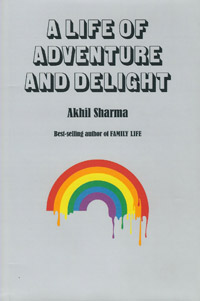 “A Life of Adventure and Delight” (202 pages; $24.95) by Akhil Sharma; published by W. W. Norton & Co. (www.wwnorton.com)
“A Life of Adventure and Delight” (202 pages; $24.95) by Akhil Sharma; published by W. W. Norton & Co. (www.wwnorton.com)
Akhil Sharma is one of our favorite authors. His award-winning “An Obedient Father” was an absolute delight and so was “Family Life,” an elegantly written novel filled with dark humor. The latest is a collection of short stories previously published in “The New Yorker,” “The Atlantic” and “The Paris Review.” Gautama, a young graduate student who finds thrill among prostitutes, appears to have found an ideal companion with whom he can settle down. However, growing frustration with his parents and girlfriend leads him to “A Life of Adventure and Delight” once again with a prostitute. “Cosmopolitan” is in the same vein as “A Life …” with a middle-aged man looking to start a new relationship. The story “Surrounded by Sleep” is essentially the condensed version of “Family Life,” in which the elder brother, Birju, is severely brain damaged after an accident in a swimming pool. The young sibling Ajay tries to cope with the tragedy and even tries to coax God. “Just get rid of the minutes when Birju lay on the bottom of the pool. What are three minutes to you?” In “You are Happy?” a mother’s bout with alcoholism leads to her murder by her own family. “The Heart is Such a Heavy Thing” looks at love versus dowry (furniture set). Thankfully, love wins for a foolhardy young man. These and a couple more stories explore the pressure from families and society on common people that can lead to silence, accusations and bitterness. Sad and tragic as the stories of their lives are, Sharma is a master storyteller at bringing them to life.
CHILDREN’S BOOK
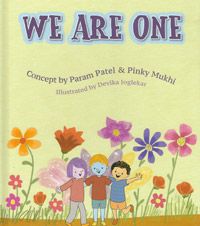 “We Are One” (38 pages; $14.95) by Param Patel and Pinky Mukhi; published by Mascot Books (www.mascotbooks.com)
“We Are One” (38 pages; $14.95) by Param Patel and Pinky Mukhi; published by Mascot Books (www.mascotbooks.com)
Six-year-old Mintu has invited his friends over for dinner. But he isn’t too sure about whether he should communicate with his mother in Gujarati or offer Indian food since “it is so different.” But his mother assures him, “Your friends love you for who you are, not what kinds of food you eat or what language you speak …” The three friends, Chirpy, Curio and Mintu, have different interests but realize that they are closer than ever after accepting their diverse backgrounds. Sure to instill children with pride for their own food, language and culture, this book celebrating diversity is a moving story that should lead to a meaningful dialogue with children of all ages. Author Mukhi was inspired to write the book after Param had been asking questions about differences between him and his friends while growing up in the United States. “We are brown. We are black. We are white. We are colorful. We come in different sizes. We come in different shapes. We speak different languages. We celebrate different festivals. We eat different food. We like different things. We are so different. We are friends. We help each other. We feel sad for others. We love each other. Love is something deep in us. We feel one with all we love. We are one in love,” reads a touching one-page note at the end. One couldn’t have said it any better.
COOKBOOK REVIEW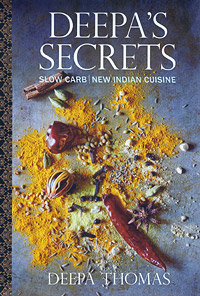
“Deepa’s Secrets: Slow Carb/New Indian Cuisine” by Deepa Thomas; 234 pages; $24.99; published by Skyhorse Publishing. (www.skyhorsepublishing.com)
It is no secret that India is the diabetes capital of the world with more than 50 million people suffering from type 2 diabetes, including the author’s husband, Thampy, of Indian origin. The culprits are rice and bread – two staples of Indian cuisine at the top of the glycemic index (GI: rating determined by a food’s ability to raise your blood sugar on a scale of 0 to 100). As soon as Deepa Thomas discovered the culprits, she dwelt into six months of cooking and eating “New Indian.” The result? The author of this well-written, invaluable book lost 20 pounds and freed her Thampy from a 10-year routine of insulin shots. No doubt, it isn’t easy to let go off carbohydrates such as rice, bread, potatoes and pasta, Thomas warns. Her solution is embracing foods high in nutrients and/or fiber and lower on the GI like whole grains, nuts, berries and leafy green vegetables more often, every 2-3 hours. The first two weeks of a slow carb lifestyle are tough but things get better, she assures you. “What I’ve invented, or reinvented, is Indian low carb or slow carb cuisine. Not no carb, which emphasizes fat consumption.” In the 70 recipes of the book, which is interspersed with interesting anecdotes from her childhood, the author advises using gut-healthy ingredients like beans, cabbage, mushrooms, leeks, blueberries, yogurt, etc. The founder of the now-defunct Deepa Textiles, who is also a painter and journalist, hopes “my food, your food, gives you great pleasure and good health, and that your healthy choices free you to find, do, be, and feel your best. That’s everything. Except the carbs.” But, of course.
Here are two of the recipes reproduced with permission from the publisher:
Aviel
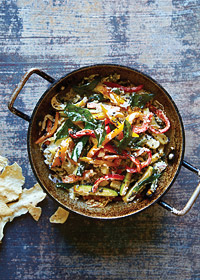 Aviel is Malayalam for vegetable medley. It is the celebration dish in Kerala. I kept the concept, but I didn’t feel the need to cook it to a mush-like consistency. This vegetable medley is al dente—a lot faster, a lot fresher, and every bit as festive.
Aviel is Malayalam for vegetable medley. It is the celebration dish in Kerala. I kept the concept, but I didn’t feel the need to cook it to a mush-like consistency. This vegetable medley is al dente—a lot faster, a lot fresher, and every bit as festive.
SERVES 4
Yogurt dressing:
- 2 cups grated coconut (thawed if frozen)
- 1 cup water
- 1 tablespoon cumin seeds, toasted and ground
- 1 jalapeño, rough chopped
- 1 tablespoon fresh ginger paste
- ½ teaspoon fresh garlic paste
- 1 cup Greek yogurt
Vegetables (cut into 2-inch sticks resembling French fries):
- 2 Yukon gold potatoes, peeled
- 2 cups string beans
- 1 carrot
- 1 zucchini
- 1 yellow, red, and orange bell pepper (3 in all)
Sauté:
- 1 tablespoon unrefined coconut oil
- 1 yellow onion (cut into 2-inch pieces resembling French fries)
- 6 curry leaves
- ½ teaspoon salt
- ½ teaspoon fresh ground black pepper
Tadka:
- 1 tablespoon unrefined coconut oil
- 1 teaspoon black mustard seeds
- 6 curry leaves
- 1 shallot, sliced
- ¼ teaspoon cayenne flakes
- 1 tablespoon unrefined coconut oil (melted over low heat) for finishing drizzle
- Puree yogurt dressing ingredients in a blender or food processor. Set aside.
- Vegetables: Blanch potatoes and beans in a large pot of salted boiling water for 2 minutes. Add carrots, blanch for 1 minute more. Add zucchini and bell peppers, blanch for 1 additional minute. Vegetables should be firmly cooked, not mushy! Drain.
- Heat coconut oil and sauté onion. When onion begins to brown, add curry leaves (protect yourself from crackling leaves, with a lid) and stir for 30 seconds. Add blanched vegetables and continue sautéing for 2 minutes. Don’t overcook! Season with salt and pepper.
- Add yogurt dressing to the sautéed vegetables and toss gently to avoid breaking up the vegetables.
- Tadka: Heat coconut oil in a large 12-inch saucepan over medium heat. Add mustard seeds and curry leaves (shield yourself from spluttering with a lid). Add shallot and stir until it begins to brown (5 minutes). Lower heat, and add cayenne flakes. Stir for one minute, and spoon tadka over the sautéed and yogurt-dressed vegetables.
- Drizzle with a final tablespoon of coconut oil as a flavor booster! Check seasoning. Serve warm or at room temperature.
Serve Aviel with Heritage Barley (Better than Rice) Pilaf, Ammachi’s Clay Pot Fish Molee and Peppery Papadum.
The humble onion promotes the growth of healthy gut bacteria, which is good for digestion, immune response, and brain function. The inulin in onion also stabilizes blood sugar levels, helping to control diabetes. Onions contain powerful antioxidants, and red and purple onions have anthocyanins (the same water-soluble pigments found in berries) with powerful anti-inflammatory and antimicrobial properties.
Smashed Chickpea and Toasted Peanut Cakes
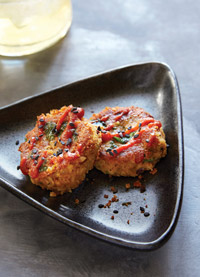 Vendors in Delhi used to toast peanuts on the streets during the cooler winter months. They’d light fires and warm the peanuts in their shells, then slip them into newspaper cones. The peanut-chickpea combo doubles the protein in this recipe for a great vegetarian meal, side, snack, or appetizer.
Vendors in Delhi used to toast peanuts on the streets during the cooler winter months. They’d light fires and warm the peanuts in their shells, then slip them into newspaper cones. The peanut-chickpea combo doubles the protein in this recipe for a great vegetarian meal, side, snack, or appetizer.
SERVES 6
Toast and grind:
- ¼ teaspoon anise seeds
- ¼ teaspoon cumin seeds
- ¼ teaspoon coriander seeds
- ¼ teaspoon fennel seeds
- 1 can (15 oz) garbanzo beans, drained and rinsed well
- 1 cup peanuts, shelled, toasted, and rough chopped (skin-on Indian peanuts are fine)
- 1 cup unsweetened shredded coconut
- 2 tablespoons onion, minced
- 2 tablespoons garlic, minced
- 1 jalapeño, minced
- ½ teaspoon garam masala
- 1 teaspoon chaat masala
- ¼ teaspoon cayenne powder
- 1 tablespoon mint leaves, stemmed and finely chopped
- 1 tablespoon cilantro leaves, stemmed and finely chopped
- 1 egg, beaten
- 1 teaspoon fresh lemon juice
- ½ teaspoon salt
- 1 cup coconut or chickpea (garbanzo) flour
- 1 tablespoon unrefined coconut oil
Make ahead: Cakes, cooked or uncooked, freeze beautifully for a grab and go snack, appetizer, or meal. Use parchment or waxed paper to separate layers before freezing.
- Toast and grind seeds. Mix all the remaining ingredients except for the flour and coconut oil. Use a hand blender to puree to a rough consistency. Check seasoning.
- Shape into 2-inch patties.
- Press patties into coconut or chickpea flour to help them hold their shape.
- Heat oil in a 10-inch nonstick skillet. Use enough oil to “moisten” the pan (about one tablespoon).
- Brown the cakes (several at a time, without crowding) over medium heat (about four minutes). Gently flip (I use two spatulas) and brown the other side (another four minutes). Repeat until all cakes are done. You may need to add oil between batches. Keep the finished cakes warm in a 200ºF oven until ready to serve.
- Serve with Reemsie’s Tamarind Sauce or Chutput Ketchup for dipping.
The chickpea and peanut cakes are a nice starter or accompaniment to Crackling Okra and Chukku’s Yogurt Salad.